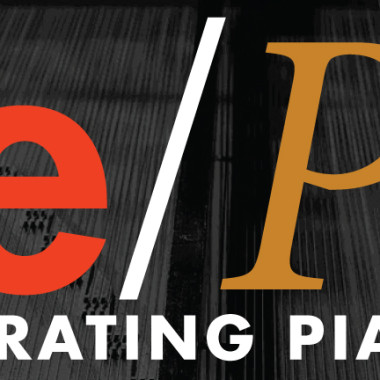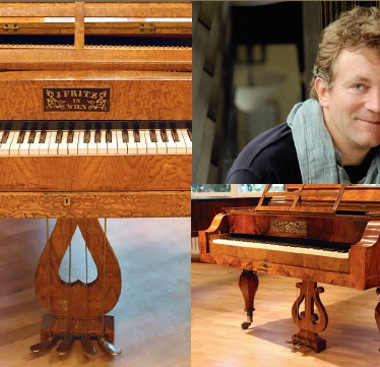Forte/Piano Festival: Beethoven Reunion Concert
© 2015 Tilman Skowroneck
Westfield Center for Historical Keyboard Studies’ Forte/Piano—A Festival Celebrating Pianos in History was held at Cornell University, Ithaca, NY, on August 5—9, 2015. These five days were packed with concerts, lectures, and master classes celebrating pianos from almost every period in the instrument’s history, as well as a very great number of pianists.
A major event of the festival was the two-part Reunion Concert on Saturday, August 8, featuring the “Cornell seven”: the seven pianists who, in 1994, became the first to perform the complete Beethoven piano sonatas live on period pianos. This ambitious project by Malcolm Bilson and six of his students, Tom Beghin, David Breitman, Ursula Dütschler, Bart van Oort, Zvi Meniker and Andrew Willis, was followed by further concerts and a CD recording. A milestone at the time, the recordings have since inspired scores of keyboardists around the world to do serious work with early pianos. The project pushed Beethoven research in a new performance-practical direction, and it remains influential today both for pianists’ and scholars’ approaches to Beethoven, and as a contribution to the world of the fortepiano in general.
The concert drew an enthusiastic crowd of festival participants, fortepiano supporters and local concertgoers. Ursula Dütschler began the concert with the Sonata Op 27/1 “quasi una fantasia,” played on a copy of an 1805 Walter piano by Paul McNulty. The sonata’s beginning was a perfect match for the general sense of expectancy in the audience. Dütschler created great suspense at the outset, and went on to present the remainder of the sonata in a true spirit of story telling. Her tone was pure and crisp, and her unifying concept for this somewhat fragmented and searching sonata clearly presented.
The next sonata on the program was Beethoven’s Op. 106 Hammerklavier, in a contemporary arrangement by Carl Friedrich Ebers for four hands. Tom Beghin and Andrew Willis played on an 1835 piano by Joseph Simon. The arrangement struck me as competent, even if the complexity of the original composition raised the suspicion that it was just as difficult to perform as the original version for one pianist. The performers have to negotiate space around the middle of the keyboard during long and massively complex musical textures, which cannot be an easy task. The performance was musically satisfying and entertaining to watch, especially after the performers’ attention gradually turned away from each other and toward the audience. This sonata concluded the first half of the program.
Zvi Meniker began the second half with the Sonata Op 31/2 Tempest. Meniker can summon a quite robust tone, while simultaneously capable of exquisitely soft shading, and his sense of timing is exceptional. The dream-like pianissimo recitative in the first movement was played with great beauty and suspense. The next performer was David Breitman. He addressed the audience in a short talk, expressing his gratitude to Malcolm Bilson for his never failing support and help, and mentioning how special it felt to hear the “Cornell Seven” together again. Afterwards, he played the Sonata Op. 110 on the Simon piano. His interpretation was remarkable for its great attention to details of the score and its overarching clarity and long structural “breath.” His execution of repeated tied notes following Beethoven’s original changing fingerings was exquisite. The final fugue was marked by unforced and clear polyphony, and the final climax became an integral part of the composition rather than a mere concluding crescendo passage that tested the limitations of the instrument.
Bart van Oort also addressed the audience, which he suggested might be “the greatest gathering of fortepianists in history,” before playing the Sonata Op 27/2 Moonlight. He took the Adagio sostenuto calmly but at a true Alla Breve tempo. The trio section of the following Allegretto was chosen somewhat slower, almost in a folksy spirit, which was very convincing. The concluding Presto was impetuous and painted in broad strokes.
Malcolm Bilson occupied the place of honor as the last performer of the evening. After a charming few words, he offered an astoundingly warm and meditative reading of Op. 109. Bilson’s unhurried performance, full of knowledge, inspiration and wisdom, was one of the highlights of the entire festival. An enthusiastic audience thanked the artists with prolongued applause.


